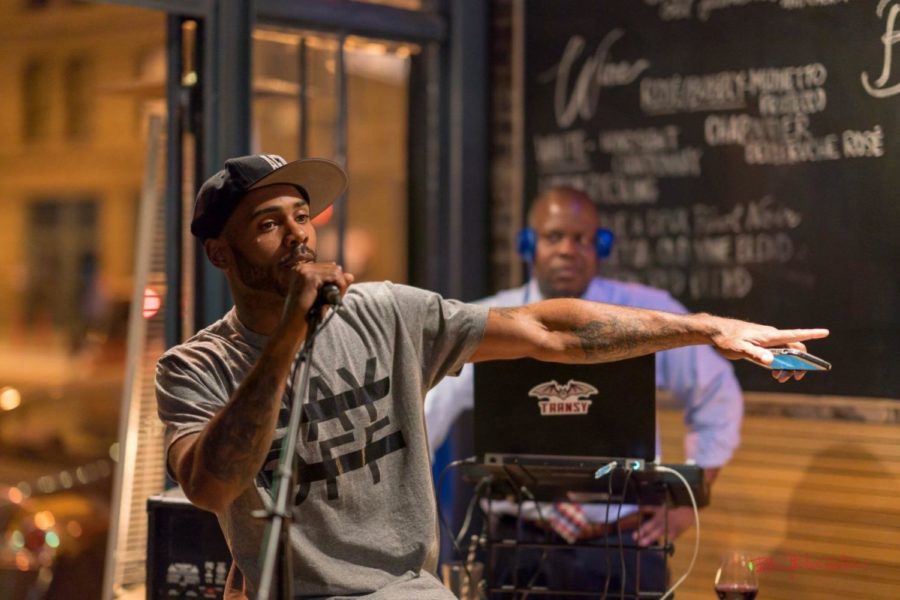This is America: Poetry in Motion celebrates diversity in Lexington and beyond
September 12, 2018
What is America? That was the question addressed at Creaux’s event, Poetry in Motion, on Sept. 11.
Poetry in Motion is an open-mic poetry slam night hosted at Creaux, a bar in downtown Lexington, one Tuesday out of every month. The event runs from April through October every year and has existed for 11 years now. The event was crafted in October of 2007 by hip hop artist, motivational speaker and freestyle instructor Devine Carama, who emceed, and head admissions officer Johnnie Johnson, who deejayed.
The idea was to create a “platform to express what is on someone’s mind and appreciate art and expression from young professionals in a bar town,” Carama said.
Walking into Creaux, people were greeted with the opportunity to sign up to read a poem in whatever expressive way they wanted. Carama began the event with a “vibe check,” where he asked deejay Johnson to play “feel-good music” to make sure the crowd was ready for the night. He continued with an announcement of the final installment of the event (as well as its 11th anniversary) on October 2.
To complete his introduction, Carama told his personal story of what he experienced on the day of the 9/11 attacks. Because this event was held on the 17th anniversary of the tragedy, the theme of the night was “America is ____.” Carama explained that they usually do not focus on theme nights to keep expression open, but felt that that day was an exception that needed to be made.
Participants in the poetry slam took the theme into their own interpretations and managed to show the diversity of the Lexington area. Carama encouraged the crowd to show love to whoever got on the mic, whether they agreed with the poet’s message or not.
Bailee Boggess, a community health worker at UK, read a poem about her life as a biracial girl growing up in Owensboro, Kentucky. This was the first time she had ever read one of her poems aloud in front of people, but it was not the first time she had written one.
“My grandmother was really into writing, and it has always been an escape for me,” Boggess said. “I was really nervous to read it out loud, but the crowd was really supportive and it made it easier. I will definitely participate again.”
The topics covered by poets ranged from religious beliefs, political trifle and personal conflict in identity. In a bar full of people, it was refreshing to the poets to know that everyone was giving their full attention.
“We usually get about 150-200 people coming to these nights,” Carama said. “Tonight was pretty average. September is typically our slowest month since school is back in session.”
The event ran in two separate sets. The sets were not limited to just poets, however, as the first set ended with a vocalist singing a song instead of reading a poem.
“Poetry over mic is the last place people can be truly heard,” Carama said.
Whether poems were about racial diversity or women’s exploitation in the media, they all took a unique perspective on what it means to be an American. On the anniversary of the tragic attack, the message of patriotism and pride in who Americans are in all of their diverse upbringings was a powerful means to connect everyone. At its core, poetry is expression, and appreciation for that expression is what united everybody that night.
































































































































































